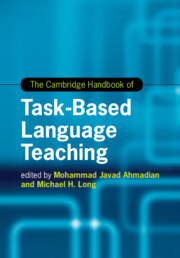Book contents
- The Cambridge Handbook of Task-Based Language Teaching
- Cambridge Handbooks In Language And Linguistics
- The Cambridge Handbook of Task-Based Language Teaching
- Copyright page
- Dedication
- Contents
- Figures
- Tables
- Contributors
- Preface The Origins and Growth of Task-Based Language Teaching
- Part I The Rationale for Task-Based Language Teaching
- Part II Tasks and Needs Analysis
- 3 Why Task? Task as a Unit of Analysis for Language Education
- 4 Adapting and Advancing Task-Based Needs Analysis Methodology across Diverse Language Learning Contexts
- 4A Developing a Task-Based Approach
- 4B A Task-Based Language Needs Analysis of Syrian Refugee Parents in Turkey
- 4C Task-Based Language Teaching in a Japanese University
- 4D The Implementation of a Task-Based Spanish-Language Program in Qingdao, China
- 5 The L in TBLT
- 5A Blustery with an Occasional Downpour
- 5B “I Have a Question”
- Part III The Task Syllabus and Materials
- Part IV Methodology and Pedagogy
- Part V Task-Based Language Teaching with School-Age Children
- Part VI The Teacher in Task-Based Language Teaching
- Part VII Task-Based Assessment and Program Evaluation
- Part VIII Research Needs and Future Prospects
- Index
- References
4A - Developing a Task-Based Approach
A Case Study of a Teacher Working with Australian Aboriginal Students in Vocational Education and Training
from Part II - Tasks and Needs Analysis
Published online by Cambridge University Press: 19 November 2021
- The Cambridge Handbook of Task-Based Language Teaching
- Cambridge Handbooks In Language And Linguistics
- The Cambridge Handbook of Task-Based Language Teaching
- Copyright page
- Dedication
- Contents
- Figures
- Tables
- Contributors
- Preface The Origins and Growth of Task-Based Language Teaching
- Part I The Rationale for Task-Based Language Teaching
- Part II Tasks and Needs Analysis
- 3 Why Task? Task as a Unit of Analysis for Language Education
- 4 Adapting and Advancing Task-Based Needs Analysis Methodology across Diverse Language Learning Contexts
- 4A Developing a Task-Based Approach
- 4B A Task-Based Language Needs Analysis of Syrian Refugee Parents in Turkey
- 4C Task-Based Language Teaching in a Japanese University
- 4D The Implementation of a Task-Based Spanish-Language Program in Qingdao, China
- 5 The L in TBLT
- 5A Blustery with an Occasional Downpour
- 5B “I Have a Question”
- Part III The Task Syllabus and Materials
- Part IV Methodology and Pedagogy
- Part V Task-Based Language Teaching with School-Age Children
- Part VI The Teacher in Task-Based Language Teaching
- Part VII Task-Based Assessment and Program Evaluation
- Part VIII Research Needs and Future Prospects
- Index
- References
Summary
This research occurred in a unique context, namely an independent Vocational Education and Training (VET) school for older adolescent Australian Aboriginal students. Many of the students at this school, past and present, come from remote communities and speak Standard Australian English (SAE) as their second language or dialect. A previously conducted needs analysis that involved collecting data from various sources and stakeholders established that the students’ needs are wide-ranging and, although mostly concerned with vocational and behavioural requirements, they involved the students developing associated communicative skills. The case study presented below provides a description of one teacher’s efforts to address his students’ needs by developing and using authentic tasks. The ‘meaning focussed’ tasks he selected and/or developed required the students to use their own linguistic resources to negotiate to achieve understanding. The examples provided show how through a task-based approach the teacher has been able to provide pedagogical opportunities that served both his students’ communicative and real-life needs.
Keywords
- Type
- Chapter
- Information
- The Cambridge Handbook of Task-Based Language Teaching , pp. 99 - 108Publisher: Cambridge University PressPrint publication year: 2021



